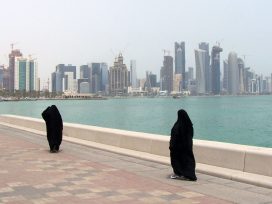Sport has always lent itself to political hijacking. When the Olympic flame completed its maiden relay journey from Mount Olympus to the summer games’ main stadium more than 70 years ago, the host nation’s head of state rose to offer a few words in the moments before the cauldron was lit. “Sporting chivalrous contest,” this leader told the 110,000 spectators, “helps knit the bonds of peace between nations. Therefore may the Olympic flame never expire.”
Powerful sentiments. But sentiments immediately undermined by recognising that the year in question was 1936 and the national leader marking a brilliant propaganda coup for his regime was Adolf Hitler. Nor was this the only attempt by the fascists to use sport as a recruiting medium. Hitler was not content with appropriating the Olympic Games. In 1936 he latched on to the success of Max Schmeling, a heavyweight boxer who defeated the African-American world champion Joe Louis on home soil in New York. One German weekly claimed that “Schmeling’s victory was not only sport. It was a question of prestige for our race,” thus ensuring that Schmeling’s subsequent first-round loss in the 1938 rematch provided a dent to Nazi ideology equal to Jesse Owens’ performances in Berlin two years earlier. Mussolini had got in on the act even earlier – Italy’s two consecutive World Cup triumphs in 1934 and 1938 were paraded as major propaganda coups for his regime, amid rumours that Il Duce may have had a quiet word with the match officials.
 This trend was to continue into the postwar period. During the Cold War the Olympics became four-yearly episodes of tit-for-tat as the United States and the Soviet Union jostled for supremacy on the international sporting stage. Of course, the latest manifestation of sport being used for political and nationalist ends is the run-up to this summer’s Olympic Games in Beijing. Spectators who turned out in London in April to see the Olympic torch on one of the legs of its journey around the world were witnesses not to a display of sporting idealism but rather a pitched battle between tracksuited Chinese torch-attendants (later rumoured to be secret service agents) and demonstrators determined to ensure that China’s human rights abuses became the dominant message of the day.
This trend was to continue into the postwar period. During the Cold War the Olympics became four-yearly episodes of tit-for-tat as the United States and the Soviet Union jostled for supremacy on the international sporting stage. Of course, the latest manifestation of sport being used for political and nationalist ends is the run-up to this summer’s Olympic Games in Beijing. Spectators who turned out in London in April to see the Olympic torch on one of the legs of its journey around the world were witnesses not to a display of sporting idealism but rather a pitched battle between tracksuited Chinese torch-attendants (later rumoured to be secret service agents) and demonstrators determined to ensure that China’s human rights abuses became the dominant message of the day.
But despite such past and present evidence of the close link between sport and politics, there are still those who determinedly cling to the notion of sport as a special sphere of human activity. Prior to the London torch debacle it fell to a children’s TV presenter to provide the most vocal expression of this view. Konnie Huq, better known for her role on Blue Peter than for her views on world affairs, insisted she was “uneasy about China’s human rights abuses and how they treat many minorities” but believed that by jogging through West London for two minutes she was taking part in something that transcended international politics. “I love the spirit of the Olympics – of bringing all the nations together on one platform,” Huq told the Sun. “Sport transcends ethnicity, culture and religion and puts everyone on an equal footing.”
Huq was invoking what has become known as the Olympic Creed, first expressed in 1908 by the founder of the modern games, Pierre de Coubertin, who declared that “The most important thing in the Olympic Games is not to win but to take part, just as the most important thing in life is not the triumph but the struggle. The essential thing is not to have conquered but to have fought well.” And Coubertin wasn’t willing to stop there. Having revived the ancient tradition of the Olympic Games, he believed the event had the power to create world peace by bringing “the youth of all countries periodically together for amicable trials of muscular strength and agility”.
But what value can any rationalist with a sense of political history attribute to such words? Might it not be more logical to concede that sport is inevitably going to be contaminated by politics and simply accept George Orwell’s characterisation of it as “war minus the shooting”?
There are some who attempt to square the circle. Professor Eric Dunning, a leading sociologist of sport, is one such commentator. “Sport appeals to so many people,” he told me when I asked why China believes it can legitimise itself through the Olympics. “It’s not like theatre or literature, which are more elitist. Sport has a democratic aspect to it. It’s so big, so popular, that political differences are bound to come into it.” Or as Bertrand Russell said in the inaugural Reith lecture in 1948, “Poetry, painting and music used to be a vital part of the daily life of ordinary men, as only sport can be now.”
But Dunning proceeds to undermine the prospect of pure, uncontaminated sport by introducing a further dimension of its appeal. He suggests that we cannot talk of its popularity without recognising that it has taken on the characteristics of a modern, secular religion. He reminds me that in The Elementary Forms of Religious Life, the great French sociologist Émile Durkheim wrote of religion from a functional perspective as something that provides cohesion and meaning in a society. Dunning says he first realised religion’s connection to sport while watching an FA Cup tie at Leicester City’s Filbert Street stadium: “At the time I was preparing lectures on Durkheim, who, in relation to religion among Australian Aboriginals, spoke of ‘collective effervescence’. As I watched Leicester play and the excitement grew inside the ground I realised, ‘what is this other than collective effervescence?’ In this sense sport is religious.”
Nick Watson, who co-founded the Centre for the Study of Sport and Spirituality at York St John University, agrees sport has come to play a religious role in many people’s lives, citing the euphoria among football fans in Newcastle when Kevin Keegan returned as their manager earlier this year. Keegan’s arrival was hailed as the “Second Coming” of a “Geordie Messiah” and while much of this was tongue-in-cheek, Watson suspects that for some supporters it contained more than a little truth, as for many fans and participants sport “is used as a source of meaning and worth in their lives. Anything that provides the greatest meaning in a person’s life has potentially become a religion for them.”
Religious groups certainly see sport as a way to reach the masses. In the US, evangelical groups such as the Fellowship of Christian Athletes have long looked to sport as a source of potential converts, aware that athletic prowess might be a means of attracting people to their way of life. As a member of another group, Athletes in Action, told the Sports Illustrated journalist Frank Deford in 1976, “We have to win to command respect.” Nor were American religious organisations unduly deflected from their prey by the clear evidence that Sundays had come to be seen as the day of sport. Instead of becoming downhearted, they promptly decided to feed off its mass appeal. Many churches now hold Super Bowl parties, where American football fans pack into God’s houses to watch the big game and the reverend fits a quick sermon in at half-time. This sporting evangelism spread from the US to the UK in the form of Christians in Sport, whose website points out that since “45% of adults and 87% of young people participate regularly in sport” but just “8% of the population attend church … sport is a pretty strategic place to start.”
Meanwhile on the Indian subcontinent, religious tensions have even crept into cricket. When India defeated Pakistan to lift the inaugural Twenty20 World Cup last year, beaten Pakistani captain Shoaib Malik chose a controversial angle for his post-match interview, saying, “First of all I’d like to thank people back home and the Muslims around the world. We gave our 100 per cent.” This raised a few eyebrows among Indian commentators, who saw Malik’s comments as yet another sign of increasing Islamisation among Pakistan’s cricketers, a trend initiated by the country’s previous captain Inzamam-ul-Haq, who often thanked Allah in interviews and regularly led his men in public prayers.
Cynics who are anxious to deny that contemporary sport retains any idealistic features have no need to rely solely on demonstrating its link to politics and religion. They merely need to cite the manner in which it is now inextricably entwined with the capitalistic ethic, with the cash nexus. Sport, as the cliché wearily insists, is big business. The organisers of the Olympics may continue to assert the amateur ethos on which the games were founded, but the leading athletes stand to make millions from sponsorship deals. British marathon runner Paula Radcliffe is known to have become a multi-millionaire on the back of sponsorship from Nike and Cadburys. Meanwhile, China has spent an estimated £20 billion on ensuring Beijing is ready for the main event, while official sponsors of the games like Coca-Cola and McDonalds will have invested millions to ensure their logos are seen wherever the Olympic rings appear.
So where does this leave sport itself? Has it merely become a servant of ideology and big business or does it retain any feature that is wholly distinctive? There is one. Sport, for all its capacity to be appropriated by other domains, retains its unpredictability, its lack of a predetermined outcome. Those who seek to use it as part of an ideological strategy, as a way of representing their stature on the world stage, have been thwarted time and again by the fact that ultimately sport cannot be guaranteed to represent anything. For all Hitler’s stage management, he couldn’t change the fact that the African-American Jesse Owens was the fastest man alive in 1936, just as he couldn’t stop Joe Louis taking apart Max Schmeling two years later.
When the French football team reached the 2006 World Cup Final against Italy, the hopes and dreams of postcolonial France rested on their shoulders. As a team consisting of players drawn from across the country’s ethnic communities they had lifted that prize on home soil in 1998, a victory French politicians hailed as a triumph for a harmonious, integrated multi-racial nation. That image was shattered somewhat by the race riots of 2005, but as captain Zinedine Zidane, the son of Algerian immigrants and the greatest player of his generation, led his men out for the 2006 final many hoped history could be repeated. Such grand ideas can prove a heavy weight on the shoulders of eleven men playing football, something never more evident than when Zidane departed the pitch, head bowed as he passed the World Cup trophy, having been sent off in extra time for headbutting the Italian defender Marco Materazzi. It was to be Zidane’s last act as a footballer. It was said at the time the “script had been written” for a glorious finale, but in sport there is no script, and one moment of madness, one act of human fallibility, can change everything – as can one moment of individual genius.
Spain’s recent triumph at the European Championships has similarly been heralded as marking a new beginning for a country long divided by regional strife. For the moment Spanish politicians will bask in the national team’s glory, but can anyone seriously believe that one moment of sporting victory, emphatic as it was, can resolve centuries of tension between between Castilians, Catalans and Basques?
Sport may resist politics, but can it be bought? If the new ideology in sport is obscene wealth, its figurehead is Roman Abramovich, the multi-billionaire Russian owner of Chelsea FC. The oligarch’s investment looked set to pay off in May as Chelsea faced Manchester United in the Champions League final, but that perfect script was torn up by that most unpredictable of all sporting spectacles – the penalty shoot-out. Just one small slip caused Chelsea captain John Terry to miss the decisive spot kick and deny his side victory, but it was the sight of him weeping inconsolably on the ground, not United lifting the trophy, that became the enduring memory of the final. Despite all the attempts at its appropriation by ideologues and businessmen, moments like that allow us to go on believing in the enduring dramatic quality of sport, its specialness.
So when we sit down to watch the Olympics this summer the excitement, the suspense and the human triumph will overshadow any attempt to control the games’ effects. As the athletes line up for the men’s 100 metres final we may without too much cognitive effort be able to suspend all political concerns and once again allow ourselves to be gripped by sport’s unique and persistent appeal. Mere hundredths of seconds will separate the leading sprinters, Usafa Powell, Tyson Gay and Usain Bolt, or for that matter any rank outsiders who may have taken the games by storm. But when that starting gun is fired on 16 August no one can be absolutely sure who will be the first to breast the tape. That’s why we’ll all be watching.

 This trend was to continue into the postwar period. During the Cold War the Olympics became four-yearly episodes of tit-for-tat as the United States and the Soviet Union jostled for supremacy on the international sporting stage. Of course, the latest manifestation of sport being used for political and nationalist ends is the run-up to this summer’s Olympic Games in Beijing. Spectators who turned out in London in April to see the Olympic torch on one of the legs of its journey around the world were witnesses not to a display of sporting idealism but rather a pitched battle between tracksuited Chinese torch-attendants (later rumoured to be secret service agents) and demonstrators determined to ensure that China’s human rights abuses became the dominant message of the day.
This trend was to continue into the postwar period. During the Cold War the Olympics became four-yearly episodes of tit-for-tat as the United States and the Soviet Union jostled for supremacy on the international sporting stage. Of course, the latest manifestation of sport being used for political and nationalist ends is the run-up to this summer’s Olympic Games in Beijing. Spectators who turned out in London in April to see the Olympic torch on one of the legs of its journey around the world were witnesses not to a display of sporting idealism but rather a pitched battle between tracksuited Chinese torch-attendants (later rumoured to be secret service agents) and demonstrators determined to ensure that China’s human rights abuses became the dominant message of the day.




